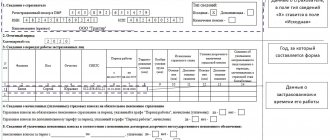Question from a visitor
Good afternoon Our organization is a call center; we have no electrical equipment other than computers. Should we have someone responsible for electrical facilities and who? Thank you in advance.
Reply to the visitor
Good afternoon In accordance with clause 1.2.3. “Rules for the technical operation of consumer electrical installations”, approved by Order of the Ministry of Energy of Russia No. 6 of January 13, 2003 (hereinafter referred to as the Rules), the head of the consumer organization (hereinafter referred to as the Consumer) is obliged to appoint a person responsible for electrical equipment and his deputy from among his managers and specialists. You have computers and office lighting, which means you are a Consumer.
There are exceptions to this rule - the person responsible for electrical equipment may not be appointed.
In accordance with clause 1.2.4. of the Rules for Consumers not engaged in production activities , whose electrical equipment includes only an input (input-distribution) device, lighting installations, portable electrical equipment with a rated voltage of no higher than 380 V, the person responsible for the electrical equipment may not be appointed .
In this case, the head of the consumer organization can assume responsibility for the safe operation of electrical installations by written agreement with the local Rostechnadzor body by filling out a statement of obligation without testing knowledge.
In the previous paragraph, attention should be paid to the term production activity.
In accordance with Article 209 of the Labor Code of the Russian Federation, production activity is a set of actions of workers using means of labor necessary to transform resources into finished products, including the production and processing of various types of raw materials, construction, and the provision of various types of services.
See also letter of the Ministry of Energy of the Russian Federation dated February 24, 2004 No. 32-01-05 “On clarification of clause 1.2.4 of the Rules for the technical operation of consumer electrical installations.” This question is explained in the letter as follows:
In connection with incoming requests about the practice of applying Art. 1.2.4 of the Rules for the Technical Operation of Consumer Electrical Installations (PTEEP), concerning the assignment of responsibility for the safe operation of electrical installations of organizations (Consumers) not engaged in production activities to their managers, Gosenergonadzor explains.
The Labor Code of the Russian Federation (Federal Law of December 30, 2001 No. 197-FZ) defines production activity as a set of actions of workers using means of labor necessary to transform resources into finished products, including the production and processing of various types of raw materials, construction , provision of various types of services (Article 209). At the same time, services that fall under the definition of “production activity” include services of a production nature, performed using means of labor, in the process of which new products are not created, but the quality of existing, created products changes (the classification of types of services is given in the All-Russian Classifier of Types economic activity OK 029-2001, approved by the Resolution of the State Standard of Russia dated November 6, 2001 No. 454-st and the All-Russian Classifier of Services to the Population OK 002-93, approved by the Resolution of the State Standard of Russia dated June 28, 1993 No. 163 (as amended No. 7/2003 , approved by the State Standard of Russia on July 1, 2003).
Consumers providing certain types of non-production services, such as: services of cultural institutions; tourist and excursion services; physical education services; legal services; trade services, etc. - may fall under Article 1.2.4 of the PTEEP. In this case, in agreement with the local state energy supervision authority, responsibility for the safe operation of electrical installations can be assigned to the managers of Consumers by issuing an appropriate statement of obligation.
The right to approve a statement-obligation to assign responsibility for the safe operation of electrical installations (Appendix 1 to PTEEP) by the decision of the head of the Federal State Institution Gosenergonadzor may be presented to the heads of subordinate Branches of the Federal State Institution.
Let's move on...
Want to know what safety legislation changes have occurred in 2021? Come to our online conference! Participation is free.
If the Consumer’s activity does not fall under “production activity” and complies with the conditions of clause 1.2.4. PTEEP, in order to agree on the assignment of responsibility for the safe operation of electrical installations to the Consumer's manager, it is necessary to submit the following documents to the territorial department of Rostechnadzor:
- a letter (application) addressed to the head of the Department on agreeing to assign responsibility for the safe operation of electrical installations to the head of the Consumer;
- statement of commitment (the form is given in PTEEP) of the Consumer's manager about assuming responsibility for the safe operation of electrical installations in the prescribed form, filled out by the applicant and signed by the person who conducted the training to ensure the safe operation of the electrical installation *;
- a copy of title documents;
- a copy of a basic single-line electrical diagram with a specific indication of electrical receivers, the purpose of premises and calculation of electrical loads;
- a copy of the act delineating the balance sheet and operational responsibilities of the parties;
- a copy of the technical conditions for technological connection;
- a copy of the acceptance or preventive testing protocols for electrical installations.
* - in accordance with clause 1.4.7. PTEEP instructions on ensuring the safe operation of electrical installations are carried out in specialized centers (training centers) for personnel training.
This is how a statement of obligation is drawn up to assign responsibility for the safe operation of electrical installations to Rostechnadzor .
Speaking about who can be responsible for electrical equipment, one common misconception should be clarified.
Some people mistakenly understand that clause 1.2.1. Rules:
Operation of Consumers' electrical installations must be carried out by trained electrical personnel. Depending on the volume and complexity of work on the operation of electrical installations, Consumers create an energy service staffed with appropriately qualified electrical personnel. It is allowed to operate electrical installations under an agreement with a specialized organization.
Who can be responsible for electrical equipment in an organization
Conducting work related to electricity at enterprises is regulated by the Rules for the Technical Operation of Consumer Electrical Installations (PTEEP), developed by the Ministry of Energy of the Russian Federation. These rules require the appointment of an employee in charge of electrical facilities in every institution that has electrical installations. A person responsible for electrical safety must also be appointed. These functions can be combined by the same person.
Clause 1.2.4. The Rules exempt heads of institutions and structural divisions from the need to appoint employees responsible for maintaining electrical facilities. This is possible in a situation where the organization only has input and distribution devices, lighting fixtures and portable electrical equipment. However, this rule does not exempt from the appointment of an employee involved in safety precautions when operating equipment connected to the electrical network.
If the organization uses equipment with a power higher than 10 kVA, then it is necessary to ensure the appointment of not only an employee managing the electrical facilities, but also his deputy. At lower capacities, deputies are not appointed.
Rules for appointing someone responsible for electrical equipment
According to the rules for the technical operation of consumer electrical installations, the consumer is obliged to appoint a person responsible for electrical equipment. This is done for proper operation of the electrical installation. For electrical installations with a power of more than 10 kW, the appointment of a deputy responsible for electrical facilities is also required. It is necessary to clarify that the real requirements of regulatory authorities are somewhat different from the normative ones, and we will talk about the real state of affairs. In practice, any organization must appoint a person responsible for electrical equipment, despite paragraph 1.2.4 of the PTEEP. Under this point, the head of the organization can, in a number of cases, assign the responsibilities of the responsible person to himself without testing his knowledge, but it is almost impossible to defend this decision before the inspector. The person responsible for electrical equipment and his deputy are included in the order for the enterprise. The form of the order changes periodically and is established by Energonadzor. The appointment of a person responsible for electrical equipment occurs only after an examination and assignment to the person in charge of electrical safety group 4 for electrical installations with voltages below 1000 V and group 5 for electrical installations with voltages above 1000 V.
Appointed persons are tied to a legal entity and can serve all objects without being tied to a specific address. The person responsible for electrical equipment can be appointed part-time, but must be on the staff of the organization and be a member of the administrative and technical staff.
Training of the person responsible for electrical equipment for group 4 is carried out in special training centers under Energonadzor. You must first obtain groups 2 and 3, which can be assigned by a commission to the organization itself from among employees with access group 4.
- The person responsible for electrical equipment must present the following documents to the inspectors of the Ministry of Emergency Situations and Energonadzor:
- Order from the head of the organization to appoint someone responsible for electrical equipment
- Logbook for testing knowledge of Norms and Rules for working in electrical installations
- Journal of issuance of protective equipment
- A copy of the minutes of the examination committee meeting
- Certificates of knowledge testing of Norms and Rules for working in electrical installations
The responsibility of the person responsible for electrical equipment is specified in the current legislation. Compliance with these rules allows the administration to reduce the extent of liability in emergency situations. Compliance with the rules in itself significantly reduces the risk of accidents and injuries.
See also:
- Rules for appointing someone responsible for electrical equipment according to PTEEP article
- Additionally - Responsible for electrical equipment in the office
© All materials are protected by the Russian Federation copyright law and the Civil Code of the Russian Federation. Full copying is prohibited without permission from the resource administration. Partial copying is permitted with a direct link to the source. Author of the article: team of engineers from OJSC Energetik LTD
Who can be appointed at the enterprise
People responsible for equipment powered by electricity may be appointed from among the employees servicing electrical installations. If specialists with the required qualifications are included in the administrative and technical staff, these employees are appointed responsible employees.
The rules allow for the presence of electrical technical personnel hired only on a part-time basis for part of the salary. However, employees of this category must be included in the staff of this institution.
A part-time worker can be appointed without verification if he is in his main job:
- maintains equipment whose complexity and energy intensity is no lower than that of the given organization;
- is part of the administrative apparatus;
- is an employee managing electrical facilities.
Hiring a responsible specialist on a part-time basis is impossible in a situation where this institution has equipment with voltages above 1000 V.
We recommend watching a video on the topic:
Appointment procedure
The employer appoints a person in charge of the entire electrical system of the organization by special order. If a company consists of several branches, then a responsible person is appointed for each of them. In this case, a hierarchy of people managing the electrical facilities of the institution is formed. A chief specialist is appointed at the head enterprise, and people responsible for the local economy are appointed at the branches.
Before appointment, the manager must verify that the candidate meets the requirements. The applicant must have the required group and undergo recertification at least once a year. Once every 5 years, specialists in this field must undergo training.
Electrical safety groups
Based on the category of personnel and equipment with which they have to work, several qualification groups have been established:
- Group I is not electrical personnel, these are, for example, PC operators. This group includes those who do not seem to perform any complex or dangerous work, but interact with equipment and theoretically could receive an electric shock.
The leader decides who exactly belongs to this group. Such personnel undergo annual training . Only a person with group 3 or higher can act as an instructor. It is first necessary to develop a training program, which includes, incl. training in safe working methods and first aid in case of electric shock.
- Group II is also assigned to non-electrical personnel, but already servicing installations and equipment with electric drives. To obtain the second group, you must have advanced knowledge, and employees with basic general or secondary education must undergo training in educational organizations for at least 72 hours .
- Group III is assigned to electrical technical personnel. It gives the right to independently (single-handedly) carry out maintenance, inspection, connection and disconnection of electrical installations up to 1000 V.
As mentioned above, holders of the third group can instruct those who are assigned the first. They have the right to supervise work in installations, i.e. act as administrative and technical personnel (they may not even perform the work themselves, but only monitor their implementation).
- Group IV - electrical personnel who service electrical installations with voltages above 1000 V. Requires even more intensive training, because This work involves high responsibility and power equipment, such as transformer substations.
- Group V - those responsible for electrical equipment and other engineering and technical personnel in installations with voltages above 1000 V (of course, they can also be responsible for installations of lower voltages).
The higher the group, the greater the amount of knowledge the employee to whom it is assigned must master. It is especially worth highlighting the person responsible for electrical equipment.
What is important to know
If an enterprise has electrical installations, its management must in all respects follow the norms of a document called the Technical Operation Rules. All supervisory authorities and inspection persons are guided in their actions by this document. An employer who neglects the standards set out in this document may not only lose his position. In case of regular violations and emergency situations, the institution may be closed, and its head will be punished.
Some small business owners assign responsibility for electrical networks and installations even when this is not necessary. There is logic in such actions. However, it is better to strictly follow the PTEEP standards. This will help not only avoid troubles, but also save effort, money and time.
Whom to appoint
Before considering a sample order for the appointment of a person responsible for electrical equipment, it is worth deciding who will appear in it. When selecting a candidate, a number of conditions must be met:
- Registration of an employment contract. An employee working under GPC will not be suitable. The head of electrical safety must be on staff.
- Joining the administrative and technical staff. He must be directly related to electrical equipment and have the skills to handle it.
- Passing the knowledge test. The team required depends on the work stress the organization is dealing with. If it is less than a thousand volts, then the applicant should have a fourth electrical safety group, if more, a fifth.
New requirements
The Consumer's electrical equipment should be understood as a combination of various technical means:
- electrical networks;
- transformers;
- switches;
- counters;
- protective devices;
- electrical receivers;
- etc.
These facilities are operated simultaneously to allow power transmission, distribution and consumption to occur. If a network disruption occurs, all devices suffer or fail, which leads to an accident at the enterprise.
Previously, the energy service at each enterprise had to be formed in accordance with state industry standards, which determined its structure, the number of employees and their responsibilities. But today it is the management of enterprises, i.e., consumers, who are allowed to do this, based on their financial situation.
Today, the unified system for providing consumers with spare parts or equipment has ceased to function in Russia.
Management is directly responsible for the operation of the Consumer's energy system, and not the Ministry of Energy, as before. But inspection of the technical serviceability of power plants at enterprises is still regularly carried out by Rostechnadzor. In addition, the organization has a school for training and retraining of electrical personnel.
Rostechnadzor has certain requirements for the structure of the electrochemical control system.
For example, at enterprises the energy service should consist of:
| Electrical staff |
|
| Electrotechnological personnel | Employees whose work depends directly on the supply of electricity. |
| Non-electrical personnel | Employees who do not fall into the first two categories. |
The work and responsibilities assigned to employees depend not only on the level of their professional training, but also on the security group they are assigned. Accordingly, new rules in 2020 are required for the person responsible for electrical equipment, because he needs to manage all groups of personnel. But each department must be headed by a master.
Required documents and job description
Instructions for the person responsible for electrical equipment are drawn up in accordance with the regulations of the Rules, clause 1.2.6. When starting his duties, the specialist signs to confirm that he has read it. If violations are subsequently noticed on his part, management has the right to apply punishment at its discretion. The composition of the instructions is not an unshakable dogma. Changes can and should be made to it. However, most often the document contains the following points:
- general rules;
- goals and objectives;
- definition of functions;
- rights and opportunities;
- measures of responsibility.
For inspectors and energy services, the person in charge must prepare the following documents:
- an order appointing him to a position;
- employee knowledge test log;
- journal on protective equipment (issued, used);
- minutes of the meeting of the certification commission that tested his qualifications (copy);
- electrical safety permit indicating the group.
Basic standards
The rules are required to be followed by all storage systems that own installations consuming voltages above 1000 V. In fact, not only large enterprises, but also individual entrepreneurs and citizens can be consumers. Specifically, Chapter 1.2 of the Order discusses the duties and responsibilities of Consumers who must adhere to these Rules.
It says there that:
- The operation of installations that belong to Consumers can be carried out by trained electrical personnel. The consumer needs to form an energy service of qualified workers and draw up job descriptions for each of them. If he does not have the opportunity to hire such specialists, he can resort to the services of specialized organizations on the basis of a contract.
- The consumer must: keep the power plant in working condition, adhering to these Rules and other technical documentation;
- From time to time, encourage workers to undergo a medical examination and conduct training at the enterprise on fire safety and labor safety;
- train electrical personnel and test their level of knowledge;
- ensure that each installation is repaired, modernized and reconstructed on time;
- When operating the power plant, comply with environmental protection requirements;
- investigate violations in the operation of power plants, accidents associated with their operation, and take appropriate measures;
- inform the State Energy Supervision authorities in a timely manner about incidents at the enterprise when they are related to the operation of power plants, and comply with the requirements of the regulatory authority;
- equip the power plant with protection and fire extinguishing equipment;
- keep track of energy consumption at the enterprise, take measures to save energy;
- carry out other activities.
Responsibilities
The responsibilities of the person responsible for electrical equipment include:
4.1. Organize the development and maintenance of necessary documentation regarding the organization of operation of electrical installations.
4.2. Organize training, instruction, testing of knowledge and permission for independent work of electrical personnel.
4.3. Organize the safe performance of all types of work in electrical installations, including with the participation of seconded personnel.
4.4. Ensure timely and high-quality performance of maintenance, scheduled preventive maintenance and preventive testing of electrical installations.
4.5. Ensure calculations of the department's electrical energy needs and monitor its consumption.
4.6. Participate in the development and implementation of measures for the rational consumption of electrical energy.
4.7. Monitor the availability, timeliness of inspections and tests of protective equipment in electrical installations, fire extinguishing equipment and tools.
4.8. Ensure the established procedure for admitting into operation and connecting new and reconstructed electrical installations.
4.9. Organize prompt maintenance of electrical installations and eliminate emergency situations.
4.10. Ensure that the power supply diagrams comply with the actual operational ones with a check mark on them (at least once every 2 years); revision of instructions and diagrams (at least once every 3 years); monitor measurements of electrical energy quality indicators (at least once every 2 years); improve the qualifications of electrical technical personnel (at least once every 5 years).
Functions of the person responsible for labor protection
As a rule, most employers believe that they need a specialist in the field of occupational safety only because regulatory authorities require this from them. An occupational safety specialist performs his duties while literally being between two fires: he must monitor compliance with safety measures on the part of workers, while constantly seeking funding for these measures from the employer. The employer, who is already gritting his teeth while paying the salary of an occupational safety specialist, cannot understand what he should spend the money on, purchasing protective equipment for his employees, which they diligently do not want to use. This is a frequently encountered paradox. And that is not all. Employees of organizations often forget that they themselves and their higher-ranking managers must ensure safety measures in the workplace, and not an occupational safety specialist, who should only monitor the implementation of these measures and, for his part, suggest how to better and more correctly organize the process. This is why a situation arises in some organizations when an OT specialist is burdened with additional workload. He is often responsible for civil defense and emergency situations and fire safety, and some managers also appoint him responsible for electrical equipment. According to the principle: anyway, if you are doing nonsense, then do everything. Of course, this is on the conscience and understanding of the head of the enterprise, how he feels about ensuring safety conditions for his employees and what responsibilities he will “reward” the OT specialist, but the issue of ensuring electrical safety at the enterprise stands somewhat apart and in no way can the OT specialist combine the functions responsible for electrical equipment.










